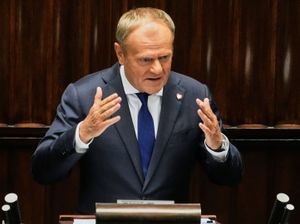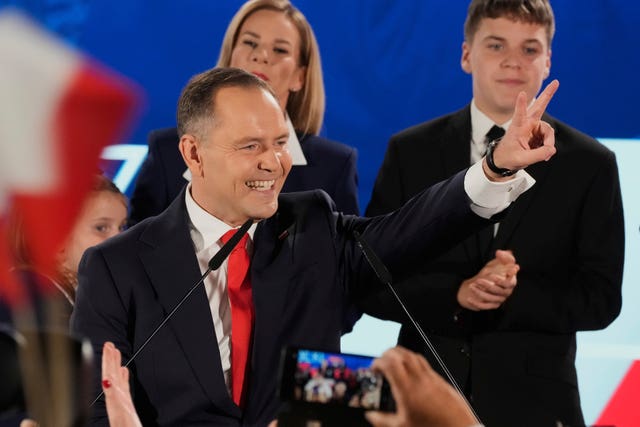Polish PM Donald Tusk survives vote of confidence as he bids to reassert control
Politicians voted 243-210 in favour of the government.

Prime Minister Donald Tusk’s government has survived a vote of confidence in the Polish parliament, with supporters rising and applauding him and chanting his name.
Politicians voted 243-210 in favour of the government in the 460-seat Sejm, the lower house, with supporters rising to applaud Mr Tusk and chant his name. There were no abstentions.
Mr Tusk requested the vote, saying Poland is in a new reality and that he was seeking a fresh opening, following the June 1 loss of Warsaw Mayor Rafał Trzaskowski — his close ally — to nationalist historian Karol Nawrocki.

Backed by US president Donald Trump, Mr Nawrocki is set to replace outgoing President Andrzej Duda, another conservative who repeatedly blocked Mr Tusk’s reform efforts.
“I am asking for a vote of confidence with full conviction that we have a mandate to govern, to take full responsibility for what is happening in Poland,” Mr Tusk said earlier in the day.
Most of the power in Poland’s parliamentary system rests with an elected parliament and a government chosen by the parliament. However, the president can veto legislation and represents the country abroad.
Mr Tusk had long counted on a Trzaskowski victory to break the institutional deadlock created by Duda’s vetoes. Instead, he now faces an incoming president aligned with the nationalist opposition and openly hostile to his government’s legislative priorities.
“We cannot close our eyes to reality,” he said. “A president who was reluctant to accept the changes we proposed for Poland and our voters is being replaced by a president who is at least equally reluctant to those changes and proposals.”
But he also argued that Mr Trzaskowski’s narrow defeat indicates that there is continued strong support for those who share his views.
The election result has rattled the already uneasy governing coalition, which spans from centre-left to centre-right and has struggled to deliver on key campaign pledges, including liberalising Poland’s abortion law and legalising same-sex civil unions.
Mr Tusk acknowledged the growing strains in Wednesday’s address.
Many are also blaming Mr Tusk for contributing to Mr Trzaskowski’s loss. Much of the criticism has come from within his coalition, as his partners examine whether they are better off sticking with him or risking a collapse of the coalition.
There are questions about what Mr Tusk can realistically achieve before the next parliamentary election, scheduled for late 2027, and whether the coalition will even survive that long amid a surge in popularity for the far right.
Polish media and political analysts are debating whether this might be the 68-year-old Tusk’s political twilight.
“I know the taste of victory, I know the bitterness of defeat, but I don’t know the word surrender,” Mr Tusk said.
As part of his fresh start, he announced plans for a government reconstruction in July that will include “new faces.”
He said a government spokesperson would be appointed in June — an acknowledgement that the coalition needs a way to present a unified message. So far Mr Tusk has sought to communicate his policies to the public himself on social media and in news conferences.
Mr Tusk served as Polish prime minister from 2007 to 2014 and then as president of the European Council from 2014 to 2019.
He became Poland’s prime minister again in December 2023 in a country exhausted by the pandemic and inflation, and with political divisions deep and bitter.
In a sign of those divisions, half of the parliament hall was empty on Wednesday, with many politicians from the right-wing Law and Justice party boycotting his speech.
Mr Tusk said their absence showed disrespect to the nation.
As politicians held a debate that went on for hours, an extreme far-right politician, Grzegorz Braun, destroyed an exhibition promoting LGBTQ+ equality in the corridors of parliament, pulling down posters and trampling on them.
Mr Braun, who has been accused of being antisemitic and extinguished Hannukah candles in parliament with a fire extinguisher in 2023, was a presidential candidate who won more than 6% of the votes in the first round of the recent election.





